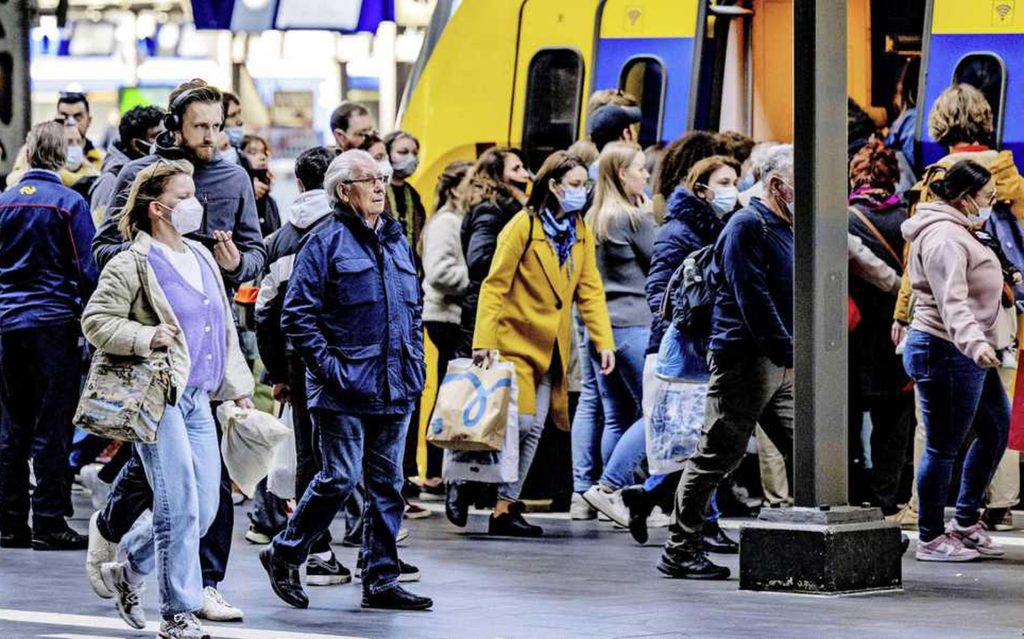
The Cabinet expects that citizens – who have become familiar with the basic procedures two years after the outbreak of the epidemic – will ensure that they do not become infected. ANP / Robin Utrecht
From now on, the Cabinet appeals to the individual responsibility of citizens and businessmen in the fight against Corona. This also applies to testing, which has to be minified in GGDs.
Self-responsibility will become the common thread for the long-term policy against Corona, which is likely to be presented next week.
This was reported by sources from The Hague.
Instead of a strong fist from above, the Dutch will now have to take action themselves to make sure they don’t injure themselves or each other. This is a clear departure from the policy previously pursued by the Council of Ministers, in which resolute measures were taken and closed several times to slow the spread of Corona.
Prevent infection by yourself
The Cabinet expects that citizens – who have become familiar with the basic procedures two years after the outbreak of the epidemic – will ensure that they do not become infected. Ventilate and wear face masks when necessary, and perhaps not everyone gathers together at the pub in the winter: Cabinet hopes the Netherlands will be wise enough to think about this for itself. Companies are also expected to protect their employees: this means that in the event of complaints or illness they should not be forced to appear in any case, something that often happened “before Corona”.
Corona support for businesses – which will disappear on April 1 – will also be a thing of the past if it is up to the Cabinet. The subsidy injection was necessary at the time to save sick entrepreneurs, but it also appears within the Cabinet that it had an unhealthy effect as it kept companies artificially struggling.
Test facilities have been reduced
According to government sources, GGD’s testing facilities will also soon be scaled back. The corona test thus becomes the responsibility of the citizen, which can be done either by known self-tests, but The Hague is also looking into the possibility of doing this by general practitioners. This way, people will still be able to get proof of recovery, which of course is not possible with self-testing.
When GGD stops testing on a large scale, the government will want to monitor the spread of the virus and the emergence of new variants in a different way. Wastewater monitoring, which is already done on a random basis, can provide a solution to this. The Department of Health, Welfare and Sports is also looking at a “broader way of modeling” corona spread, because RIVM models have often proven inaccurate in the past.
still worried
Although the new cabinet line is based on optimism that we can control Corona ourselves, there are concerns as well. The warning: “Corona will not go away, not the flu.” For example, the emergence of a new variable may mean that measures will have to be taken again in the long run.
Cabinet also hopes there will be more enthusiasm for booster injections. Enthusiasm for this is waning rapidly, possibly due to the moderation of the omicron variable. Even among the vulnerable and the elderly, the government is seeing that the number of people who come in for a frequent shot has gone down.
The long-term plan to be released next week by the Minister for Combating the Coronavirus, Ernst Kuipers, is part of a broader change of course. He has previously declared that with respect to him, restrictions in society should not be the dominant factor.
“We are moving from risk exclusion to more control and to a lifestyle as normal as possible,” Kuipers said earlier. Keeping the community open should be the starting point.

“Total coffee specialist. Hardcore reader. Incurable music scholar. Web guru. Freelance troublemaker. Problem solver. Travel trailblazer.”







More Stories
GALA lacks a chapter on e-health
Weird beer can taste really good.
Planets contain much more water than previously thought